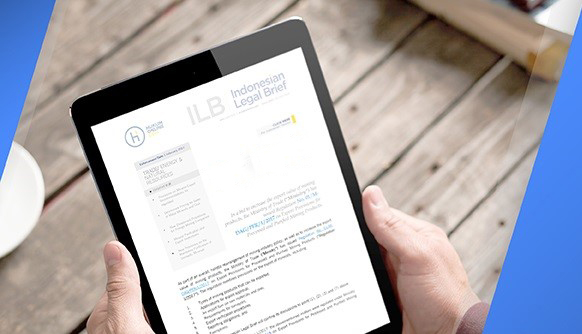
In an effort to protect members of the general public from the risks associated with the online distribution of unsafe food and drug products, the National Agency of Drug and Food Control (Badan Pengawas Obat dan Makanan – “BPOM”) has issued Regulation No. 8 of 2020 on the Supervision of the Online Distribution Foods and Drugs, as amended by Regulation No. 32 of 2020 (collectively referred to as “Regulation 8/2020”). In essence, Regulation 8/2020 sets out various requirements and procedures for the online distribution of drugs, traditional medicines, health supplements, cosmetics, processed foods and processed foods for specific medical purposes (Pangan Olahan Untuk Keperluan Medis Khusus – “PKMK”).[1]
However, some of the provisions that specifically address the online distribution of food and drug products, as featured under the framework of Regulation 8/2020, are no longer in accordance with current legal requirements. As a result, BPOM is currently preparing the Draft Regulation on Control over the Online Distribution Food and Drugs (“Draft Regulation”) which, when it ultimately comes into force, will repeal and replace the existing legal framework on online food and drug control procedures.[2] In addition to revising the applicable legal framework for this area, BPOM has commenced implementation of various online and offline monitoring efforts, including cyber-patrols that monitor sales of cosmetics products.[3] In this regard, BPOM had already discovered 108,141 links to sellers that it subsequently recommended for blocking as of February 2024.[4]
In essence, the Draft Regulation retains the core obligations that apply to business entities that engage in the distribution of food and drug products that were originally set out under the framework of Regulation 8/2020. However, the Draft Regulation also now addresses medicinal substances and food additives (Bahan Tambahan Pangan – “BTP”) in the scope of the provisions that address the distribution of food and drug products (collectively referred to as “Products”).[5]
Against the above backdrop, this edition of Indonesian Legal Brief (ILB) offers a summary of the various provisions that feature under the framework of the Draft Regulation, specifically as they relate to the following matters:
Expanded Electronic Systems Selection Criteria for Business Actors
As the Draft Regulation has now expanded the list of Products that are permitted to be distributed online, the types of business actors included under the Draft Regulation have also now been expanded.[6] In this regard, the Draft Regulation states that business actors are required to choose electronic systems through which they will distribute their Products in accordance with their respective forms of business and in line with the following criteria:
| Business Actors | Electronic Systems Providers |
| Business actors operating within the food and drug sector[7] | Independently or in collaboration with Electronic Systems Operators (Penyelenggara Sistem Elektronik – “PSE”)/Organizers of Trading Through Electronic Systems (Penyelenggara Perdagangan Melalui Sistem Elektronik – “PPMSE”) |
| Pharmaceutical industries[8] | Independently or in collaboration with PSE/PPMSE-certified pharmaceutical industries |
| Pharmaceutical wholesalers (Pedagang Besar Farmasi/PBF)[9] | Independently or in collaboration with PSE/PPMSE-certified PBF |
| PBF branches[10] | Main electronic systems of PBF |
Moreover, electronic systems that are selected by business actors for the online distribution of Products must comply with the following provisions at the least:
| Electronic Systems Requirements for Drugs, Natural Medicines, Quasi-Medicines, Health Supplements, Cosmetics and/or Processed Foods[11] | Electronic Systems Requirements for Drugs and PKMK[12] |
|
|
Updated Requirements for Electronic Systems Operators
The Draft Regulation has now also updated the requirements that have to be met by PSE/PPMSE/Pharmaceutical Electronic Systems Operators (Penyelenggara Sistem Elektronik Farmasi – “PSEF”) in order to be permitted to provide, manage and operate electronic systems through which food and drug products are distributed online, as follows:[13]
It should also be noted that electronic systems are only permitted to be used during the procurement and distribution of drugs and medicinal substances by business actors who have secured business licenses as pharmaceutical industries or PBF.[14]
Expanded Prohibitions on the Online Distribution of Products by Business Actors
When the Draft Regulation comes into force, business actors will be obliged to comply with the following prohibitions regarding the online distribution of food and drug products:
| Business Actors | Prohibitions |
| PSE/PPMSE/PSEF | Provision of sales information for Products that are prohibited from being distributed online[15] |
| Pharmaceutical industries, PBF and PBF branches | Online distribution of drugs and medicinal materials directly to the general public[16] |
| Third parties acting as deliverers of drugs and/or PKMK | Provision of information services regarding drugs and/or PKMK [17] |
| All business actors |
|
Key Takeaways
When the Draft Regulation ultimately comes into force, all relevant business actors must comply with all of the obligations contained therein, including provisions that specifically address the selection of eligible electronic systems and efforts to ensure that selected providers of electronic systems meet all of the relevant requirements and criteria. In addition, business actors are also obliged to observe the various prohibitions that are outlined above in order to avoid being subject to the imposition of administrative sanctions.
Source: hukumonline.com



National Economy
Regional Economy
National Economy
Regional Economy